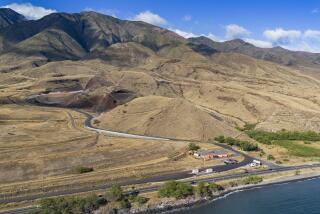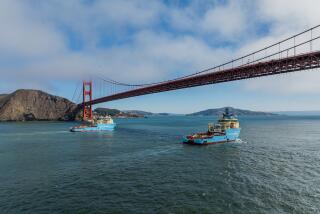Marshall Islands Hope to Profit on Imported Garbage : U.S. Trash May Be Their Treasure
- Share via
MAJURO, Marshall Islands — Bucking the global trend, a chain of Pacific islands is eyeing a multimillion-dollar plan to import American garbage.
While countries around the world are giving a thumbs down to the international trade in waste, the Marshall Islands sees profit and possible salvation from a plan to import up to one-tenth of the nontoxic waste produced on the West Coast.
The waste would be used as landfill to enlarge the chain of remote, low-lying atolls. In return, the Marshall Islands would also get millions of dollars in fees for the trash.
The nation’s parliament passed a resolution in March authorizing President Amata Kabua to negotiate a deal with a California-based company to ship millions of tons of rubbish.
Several other Pacific islands have recently turned down similar deals offered by U.S. firms to dispose of trash.
Admiralty Pacific Inc., a waste disposal company, hopes to begin transporting garbage to the Marshalls, 4,200 miles southwest of the United States, by June, 1990, and eventually ship tens of millions of tons a year.
Kabua, who first endorsed the scheme last October after meeting with Admiralty officials, says he wants the garbage for the money and for badly needed landfill in the archipelago.
The atolls cover a 70-square-mile area and few of its islands rise more than 5 feet above the sea.
But the environmentalist group Greenpeace is accusing the company, which says it wants to ship 10% of household waste produced on the U.S. West Coast, of trying to evade American regulations on waste disposal.
International Treaty
Most of the world’s nations reached agreement on March 22 in Basel, Switzerland, on an international treaty to control the export of hazardous waste.
The convention aimed to curb what African countries called “garbage imperialism,” dumping of waste by the West in the Third World.
Admiralty’s owner, Dan Fleming, says the company will respect Majuro and Washington safety laws in shipping the waste to the Pacific nation, an operation he says will be cheaper than transporting it by land to other parts of the United States.
Imported waste is not a new concept to the 43,000 inhabitants of the Marshall Islands, a double chain of low-lying coral atolls that Washington used as a nuclear testing site in the 1950s.
Some 66 nuclear weapons were exploded on Bikini and Enewetak atolls at that time, and some areas are still uninhabitable due to radiation contamination.
The islands were a former United Nations Trust Territory administered by Washington until gaining semi-independence in 1986. They depend on U.S. aid for 90% of their government budget.
Members of Majuro’s Parliament hotly debated the resolution on the garbage plan before passing it on March 10 by a 20-3 majority. Critics raised fears that the Marshalls might unknowingly end up importing toxic waste.
Sen. Hiroshi Yamamura, who represents an island contaminated by radioactive fallout from the 1950s testing, said Majuro had no way to be sure that the waste was safe.
“Do we really trust the Americans?” he asked in Parliament. “How can we know that the so-called household garbage is nontoxic waste?”
“Admiralty Pacific may hide the toxic waste in order to get the money,” said Senator Tony de Brum. “More than 40 nations have turned down the U.S. offer regarding the dumping proposal. Why should the Marshall Islands accept it?”
In the last year, Papua New Guinea, Western Samoa, the Solomon Islands and Tonga have turned down a variety of waste disposal and incineration schemes proposed by American firms.
Greenpeace estimates that a ton of American household garbage contains 20 pounds of toxic material, such as cleaning fluids, lead-based paints and pesticides, and that their removal would make a deal like the one proposed by Admiralty unprofitable.
President Kabua, who hopes to bring in as much as $56 million a year importing the trash, and his cousin and sponsor of the resolution, Sen. Imata Kabua, said Majuro could hire scientists to evaluate the safety of the plan.
The Majuro government says the plan still depends on the completion of environmental, landfill and other studies to see if it will benefit the Marshall Islands.
Admiralty is expected to complete an engineering feasibility study, which it began in January, this month.
The British pressure group Ark said last month that global warming because of the pollution-induced “greenhouse effect” could raise the world’s sea levels by more than 15 feet over the next 60 years.
If such studies prove true, the Marshalls could be totally submerged.
More to Read
Sign up for Essential California
The most important California stories and recommendations in your inbox every morning.
You may occasionally receive promotional content from the Los Angeles Times.













